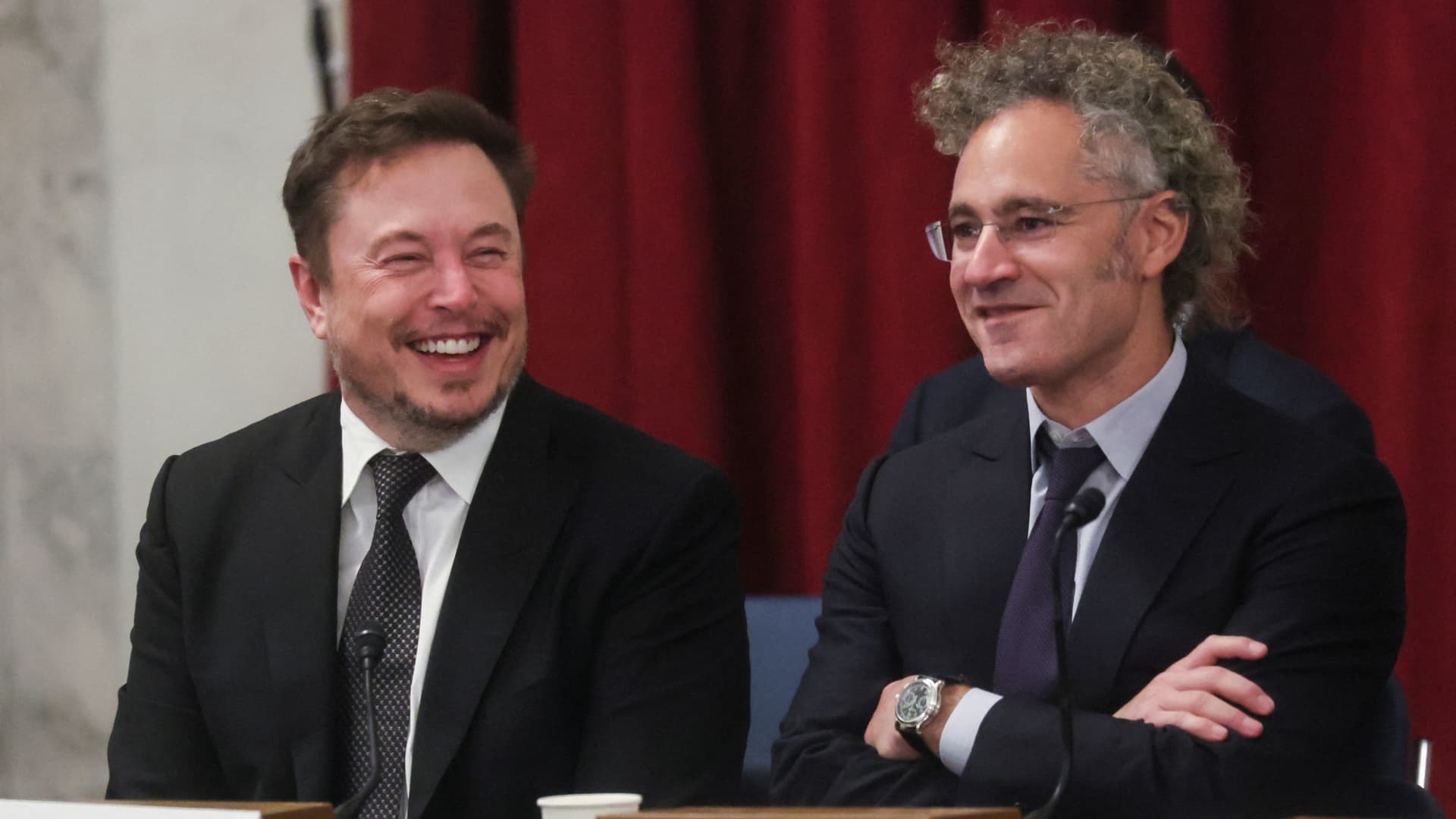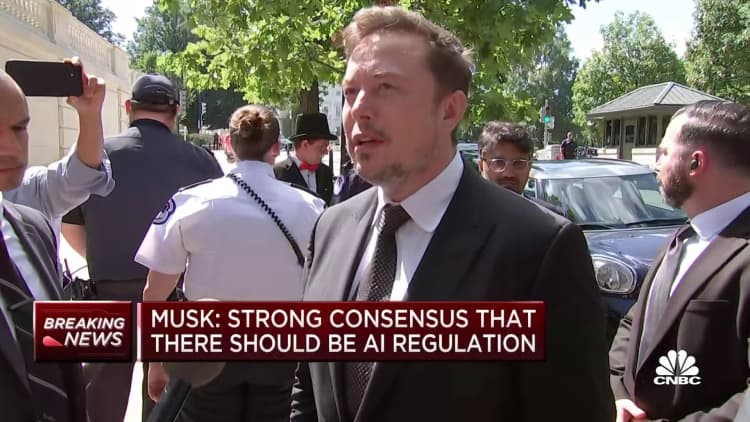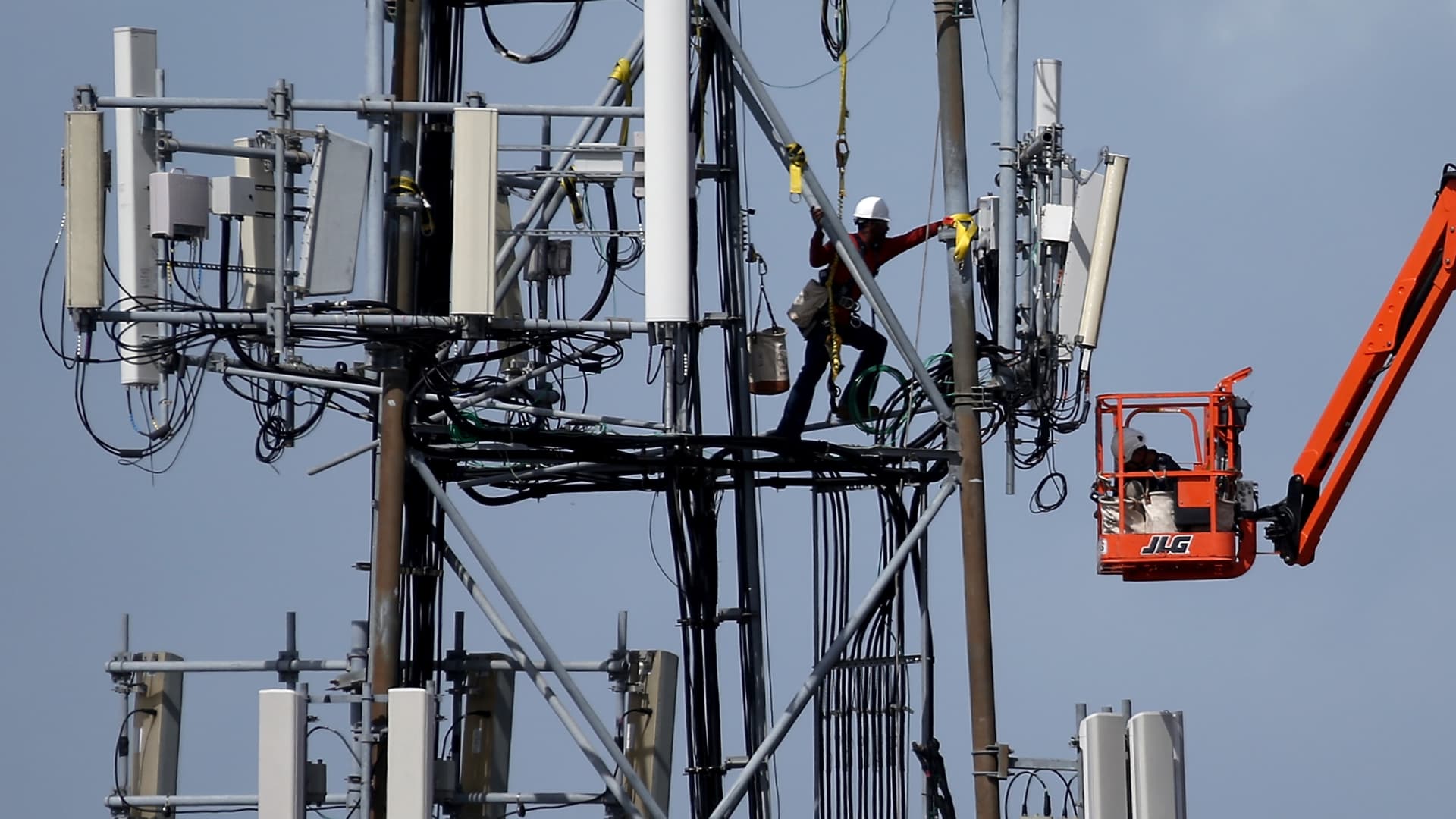
Elon Musk and Palantir co-founder & CEO Alex Karp attend a bipartisan Artificial Intelligence (AI) Insight Forum for all U.S. senators hosted by Senate Majority Leader Chuck Schumer (D-NY) at the U.S. Capitol in Washington, U.S., September 13, 2023.
Leah Millis | Reuters
Tech CEOs descended on Capitol Hill Wednesday to speak with senators about artificial intelligence as lawmakers consider how to craft guardrails for the powerful technology.
It was a meeting that “may go down in history as being very important for the future of civilization,” billionaire tech executive Elon Musk told CNBC’s Eamon Javers and other reporters as he left the meeting.
Senate Majority Leader Chuck Schumer, D-N.Y., hosted the panel of tech executives, labor and civil rights leaders as part of the Senate’s inaugural “AI Insight Forum.” Sens. Mike Rounds, R-S.D., Martin Heinrich, D-N.M., and Todd Young, R-Ind., helped organize the event and have worked with Schumer on other sessions educating lawmakers on AI.
Top tech executives in attendance Wednesday included:
- OpenAI CEO Sam Altman
- Former Microsoft CEO Bill Gates
- Nvidia CEO Jensen Huang
- Palantir CEO Alex Karp
- IBM CEO Arvind Krishna
- Tesla and SpaceX CEO Elon Musk
- Microsoft CEO Satya Nadella
- Alphabet and Google CEO Sundar Pichai
- Former Google CEO Eric Schmidt
- Meta CEO Mark Zuckerberg
The panel, attended by more than 60 senators, according to Schumer, took place behind closed doors. Schumer said the closed forum allowed for an open discussion among the attendees, without the normal time and format restrictions of a public hearing. But Schumer said some future forums would be open to public view.
Top U.S. technology leaders including Tesla CEO Elon Musk, Meta Platforms CEO Mark Zuckerberg, Alphabet CEO Sundar Pichai, OpenAI CEO Sam Altman, Nvidia CEO Jensen Huang, Microsoft CEO Satya Nadella, IBM CEO Arvind Krishna and former Microsoft CEO Bill Gates take their seats for the start of a bipartisan Artificial Intelligence (AI) Insight Forum for all U.S. senators hosted by Senate Majority Leader Chuck Schumer (D-NY) at the U.S. Capitol in Washington, U.S., September 13, 2023.
Leah Millis | Reuters
The panel also featured several other stakeholders representing labor, civil rights and the creative industry. Among those were leaders like:
- Motion Picture Association Chairman and CEO Charles Rivkin
- AFL-CIO President Liz Shuler
- Writers Guild President Meredith Steihm
- American Federation of Teachers President Randi Weingarten
- Leadership Conference on Civil and Human Rights President and CEO Maya Wiley
After the morning session, the AFL-CIO’s Shuler told reporters that the meeting was a unique chance to bring together a wide range of voices.
In response to a question about getting to speak with Musk, Shuler said, “I think it was just an opportunity to be in each other’s space, but we don’t often cross paths and so to bring a worker’s voice and perspective into the room with tech executives, with advocates, with lawmakers is a really unusual place to be.”
“It was a very civilized discussion actually among some of the smartest people in the world,” Musk told reporters on his way out. “Sen. Schumer did a great service to humanity here along with the support of the rest of the Senate. And I think something good will come of this.”
Google’s Pichai outlined four areas where Congress could play an important role in AI development, according to his prepared remarks. First by crafting policies that support innovation, including through research and development investment or immigration laws that incentivize talented workers to come to the U.S. Second, “by driving greater use of AI in government,” third by applying AI to big problems like detecting cancer, and finally by “advancing a workforce transition agenda that benefits everyone.”
Google CEO Sundar Pichai, arrives for a US Senate bipartisan Artificial Intelligence (AI) Insight Forum at the US Capitol in Washington, DC, on September 13, 2023.
Mandel Ngan | AFP | Getty Images
Meta’s Zuckerberg said he sees safety and access as the “two defining issues for AI,” according to his prepared remarks. He said Meta is being “deliberate about how we roll out these products,” by openly publishing research, partnering with academics and setting policies for how its AI models can be used.
He touted Meta’s open-source AI work as a way to ensure broad access to the technology. Still, he said, “we’re not zealots about this. We don’t open source everything. We think closed models are good too, but we also think a more open approach creates more value in many cases.”
Working toward legislation
Schumer said in his prepared remarks that the event marked the beginning of “an enormous and complex and vital undertaking: building a foundation for bipartisan AI policy that Congress can pass.”
There’s broad interest in Washington in creating guardrails for AI, but so far many lawmakers have said they want to learn more about the technology before figuring out the appropriate restrictions.
But Schumer told reporters after the morning session that legislation should come in a matter of months, not years.
“If you go too fast, you could ruin things,” Schumer said. “The EU went too fast, and now they have to go back. So what we’re saying is, on a timeline, it can’t be days or weeks, but nor should it be years. It will be in the general category of months.”
U.S. Senate Majority Leader Chuck Schumer (D-NY) addresses a press conference during a break in a bipartisan Artificial Intelligence (AI) Insight Forum for all U.S. senators at the U.S. Capitol in Washington, September 13, 2023.
Julia Nikhinson | Reuters
Schumer said he expects the actual legislation to come through the committees. This session provides the necessary foundation for them to do this work, he said. Successful legislation will need to be bipartisan, Schumer added, saying he’d spoken with House Speaker Kevin McCarthy, R-Calif., who was “encouraging.”
Schumer said he’d asked everyone in the room Wednesday if they believe government needs to play a role in regulating AI, and everyone raised their hand.
The broad group that attended the morning session did not get into detail about whether a licensing regime or some other model would be most appropriate, Schumer said, adding that it would be discussed further in the afternoon session. Still, he said, they heard a variety of opinions on whether a “light touch” was the right approach to regulation and whether a new or existing agency should oversee AI.
Young said those in the room agreed that U.S. values should inform the development of AI, rather than those of the Chinese Communist Party.
While Schumer has led this effort for a broad legislative framework, he said his colleagues need not wait to craft bills for their ideas about AI regulation. But putting together sensible legislation that can also pass will take time.
Sen. Maria Cantwell, D-Wash., who leads the Commerce Committee, predicted lawmakers could get AI legislation “done in the next year.” She referenced the Chips and Science Act, a bipartisan law that set aside funding for semiconductor manufacturing, as an example of being able to pass important technology legislation fairly quickly.
“This is the hardest thing that I think we have ever undertaken,” Schumer told reporters. “But we can’t be like ostriches and put our head in the sand. Because if we don’t step forward, things will be a lot worse.”
WATCH: Elon Musk: There is an ‘overwhelming consensus’ that there should be some AI regulation








